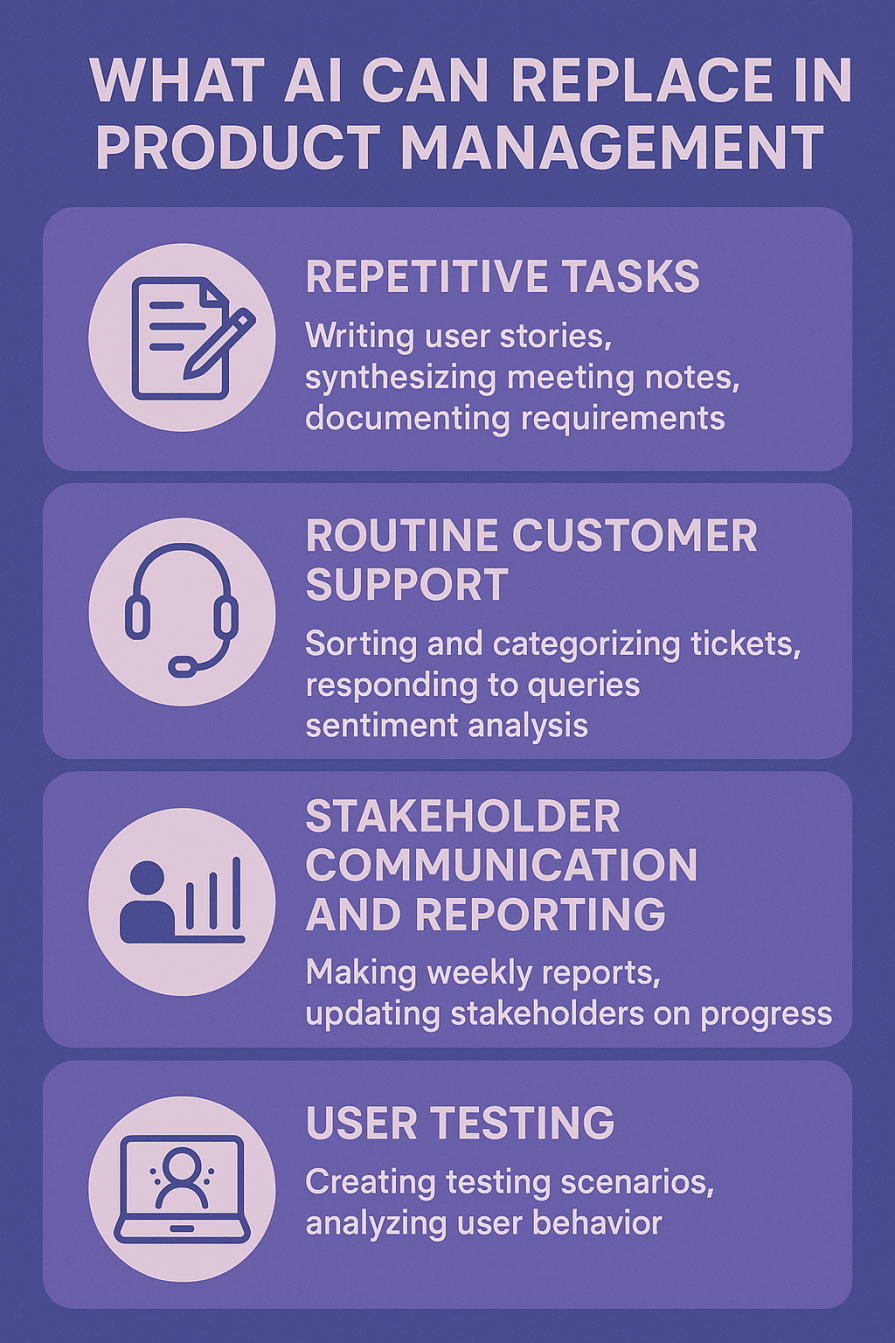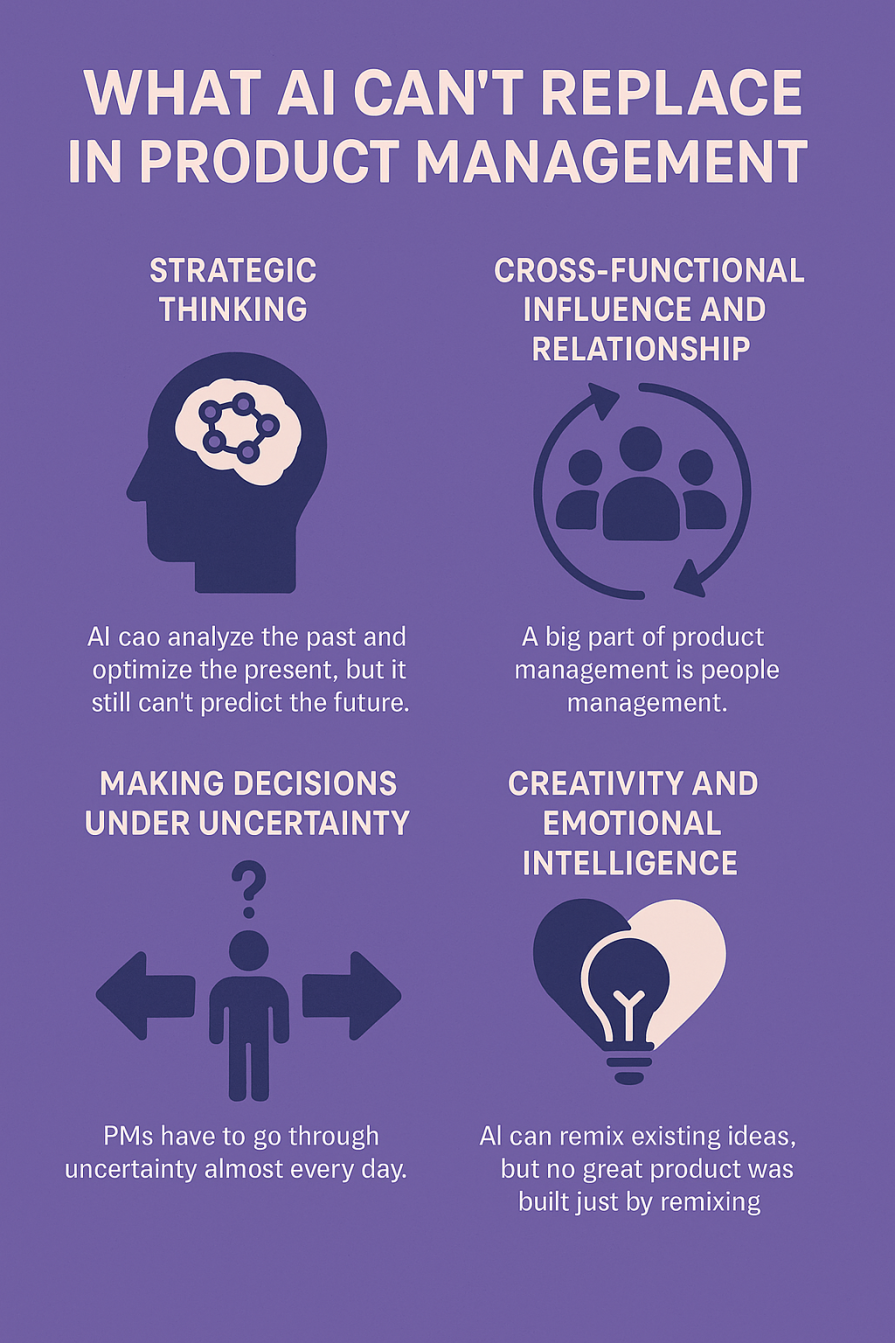Will AI replace PMs? How to future-proof your role
Whenever I open PM groups on Reddit, Facebook, or WhatsApp, I see people asking the same question: “Will AI take my job?” It’s a valid concern. I’ve already seen AI agents take over some basic product manager duties like:
- “Hi ChatGPT, can you make a three month roadmap of my product? Here are the product details…”
- “Hi Claude, can you help me with research questions for my customers? Here’s the information I’m looking for…”
- “Hi Perplexity, can you analyze this data and tell me your findings?”
AI is no longer the future — it’s right here, right now. In just a few clicks, you can create a short-term roadmap or develop research questions for market analysis.
So will PMs vanish amid the AI revolution? And as a PM, how can you future-proof your career?
This blog post talks about what AI can and can’t replace in the world of product management, along with the tools you can use and action items to start on today to become an AI-powered PM. By the end, you’ll be more aware of the reality of AI and how you can future-proof your PM career without worrying about whether AI will take your job away or not.
Why AI is disrupting product management
The launch of ChatGPT on November 30, 2022 changed and challenged the lives of PMs. In fact, it’s not only PMs, but the stakes are high for developers, engineers, designers, marketers, and sales professionals.
When I was at Zalando, I used to have two to three meetings with the UX and research teams to come up with research questions for users. Then, we used to come up with a structure for how we would save the research information. After doing the research, we manually used it to find out logical trends and come up with a hypothesis.
In 2025, you can do all of this with a simple series of prompts.
Here are some key trends that show AI is disrupting product management:
Faster and smarter decision-making
Traditionally, product decisions have been based on intuition, market research, customer feedback, and stakeholder feedback. But today, AI allows you to summarize user feedback at scale. PMs can use any AI-based tool for predictive analysis and even seek help building a roadmap
Automation of low-effort and high-impact repetitive tasks
One of the big parts of product management is writing user stories and document requirements, as well as maintaining backlogs. But today, AI agents can automate all of these. Microsoft Copilot can draft example user stories from feature descriptions and you can add meeting transcripts to feature requirements
Better relationships with technical teams
PMs (and especially those with a non-technical background) have always had a bit of a hard time working with technical teams. But AI is changing that. You can easily ask ChatGPT questions to understand technical aspects of software engineering. Some PMs are even skilled enough now to build an MVP without the help of technical teams.
AI isn’t just a tool anymore. It’s a fundamental shift in how product management has been done up to now. It’s reshaping every layer of product management. But, will AI replace PMs?
What can AI replace in product management?
While AI is undoubtedly changing product management, it’s important to understand what parts of product management AI can actually replace:
- Repetitive tasks — As shared in the earlier example, PMs spend a considerable time writing user stories, coming up with research questions, synthesizing meeting notes, and documenting requirements. Essentially, all the tasks that require low effort but are high impact. AI tools can now handle these tasks effectively
- Routine customer support — You know how much time it takes to go through each and every customer ticket and gather meaningful insights. AI can be trained to sort, categorize, and even respond to customer queries with basic knowledge. Additionally, AI-powered sentiment analysis tools can automatically browse through customer support data and identify potential customer pain points and emerging feature requests
- Stakeholder communication and reporting — PMs spend a considerable time making weekly reports for stakeholders and updating them on the progress. AI agents can easily create these reports and even send them automatically, providing insights to the stakeholders without the manual effort of crafting each report
- User testing — AI can also take over creating testing scenarios. These platforms can automatically analyze user behavior during tests and even predict how users will interact based on historical data
If you review the list above, you’ll notice that although these tasks are important, they don’t require a lot of domain expertise. But what about those tasks that require domain expertise? Will they also be replaced by AI?
What AI can’t replace in product management
While AI can replace some parts of product management, it can’t replace the core parts that remain deeply human. These are the areas where humans excel simply because they have feelings:
Strategic thinking
AI can analyze the past and optimize the present, but it still can’t predict the future. Predicting the future requires an understanding of human behavior and market context, as well as a sense of where the world’s heading.
This is what makes up your product vision and strategy, and no AI in its current form can replace humans to connect the dots between your market, customers, and company.
Cross-functional influence and relationship
A big part of product management is people management. This means talking to multiple teams, understanding their expectations, and keeping everyone aligned. AI can’t navigate team dynamics, resolve conflicts, or inspire a group to chase a vision.
Making decisions under uncertainty
The 2020 pandemic was one of the biggest unplanned ever. On a smaller scale, PMs have to go through uncertainty almost every day. Sometimes it might be that a team member is sick, while other times you might not have as clear of data as you would like. AI can’t help with such uncertainties.
Creativity and emotional intelligence
The last part of being human is that we can think on our own and have emotions. AI can remix existing ideas, but no great product was built by remixing alone. You need a bag full of creative thoughts and emotional intelligence to build something substantial.
At the same time, emotional intelligence plays a huge role in product success. Understanding team dynamics, navigating stakeholder motivations, interpreting user frustration, and balancing short-term delivery with long-term trust, requires deeply emotional, human decisions.
The rise of AI-powered PMs
AI isn’t replacing PMs, but it’ll replace the PMs who don’t know how to leverage AI. This doesn’t mean an AI-powered PM will simply use ChatGPT and copy paste and its output. Think of these people as the ones who use AI to research deeper, find granular insights, and think bigger.
An AI-powered PM:
- Uses AI as a sparring partner, not just a tool that brainstorms ideas or validates them
- Builds MVPs individually without the need of an engineering team and tests them with the customers, keeping the costs and timeline low
- Combines AI with personal intuition to come up with meaningful insights, trends, and hypothesis
- Brings more clarity to cross-functional teams by using AI to remove roadblocks and risks
- Constantly upskills themselves without being stuck on one particular tool
If you haven’t already started developing AI literacy, I highly recommend you to start.
Tools to get started with AI-powered product management
To start implementing AI into your product management, try using some of the following tools:
| Tool name | Free or paid | Description | PM use-case |
| ChatGPT | Free (basic) / paid (pro) | Conversational AI for ideation, drafting, and problem-solving | Brainstorm features, write user stories, create docs, summarize research, mock interview scripts |
| Cursor | Free (basic) / paid (pro) | AI-powered code editor optimized for product builders that can’t code | Build MVPs, generate product prototypes, and collaborate on technical experiments |
| Perplexity AI | Free (pro version available) | AI search engine with citations and web-backed answers | Conduct market research, competitive analysis, gather insights from the web |
| Claude (anthropic) | Free (limited) / paid (pro) | Conversational AI is known for longer memory and thoughtful replies | Deep dives into product strategy, refining research questions, ethical discussions, and summarizing long documents |
| Miro Assist | Paid (AI in premium plans) | AI features in collaborative whiteboard tool | Create mind maps, organize brainstorming sessions, and generate retrospective summaries |
| Notion AI | Paid (Notion AI add-on | An AI assistant built into Notion for content creation and knowledge management | Generate meeting notes, summarize documents, write PRDs, and auto-fill product templates |
| Replit | Free (basic) / paid (pro) | Pretty much like Cursor — helps build websites without the need of coding | Build MVPs, generate product prototypes, and collaborate on technical experiments |
Action items for AI-powered PMs
You can get started becoming an AI-powered PM by taking these key actions:
- Experiment and build your own AI stack — Try out the tools above and figure out which one you’re comfortable with and which one gives you the desired output. Then double down and master that tool
- Start using AI in your daily workflow — I recommend starting with low-risk tasks such as summarizing meeting notes, drafting less important user stories, and generating release notes. This article is a great resource to start with
- Learn prompt engineering — All the AI tools in the world are worthless if you don’t know how to use them. This requires you to understand what prompts to give and in what way. Learn more about effective prompt writing here
- Build something yourself — Use Cursor or Replit and build something that you would use yourself. This’ll give you an understanding of how you can build MVPs that solve real problems for your customers
- Stay updated — Keep an eye on the market since it seems like every other day there’s a new AI tool coming up
Final thoughts
I opened this post on the question of whether AI will eventually replace PMs. Ultimately, I don’t think it will, but it’ll definitely replace the PMs who don’t use it.
Because of this, it’s extremely important to upskill yourself and stay up-to-date with what’s happening in the realm of AI. Using AI will help make it easier for you to build useful products that customers want to pay for.
At the end of the day, AI-powered PMs aren’t the future, they’re already the present.
Featured image source: IconScout
The post Will AI replace PMs? How to future-proof your role appeared first on LogRocket Blog.
This post first appeared on Read More




